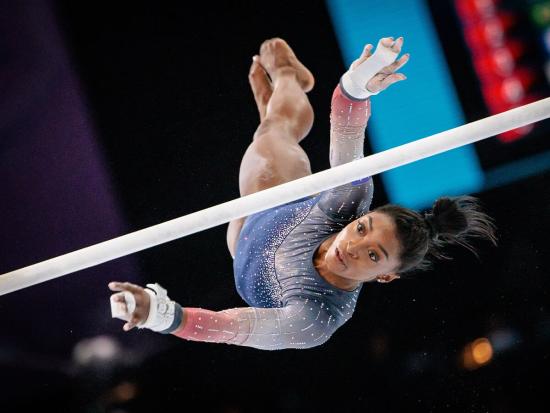
There was once a time when Simone Biles would find “beauty in the blindness” before the Olympics, basking in not knowing what she didn’t know. However, that was eight years ago, back when Biles was still a teenager and kind of “ditzy.” Those days are long gone. The evidence isn’t just on Biles’s marriage certificate or driver’s license, but in how the 27-year-old can see beyond herself. The tunnel vision that most great athletes have in pursuit of greatness has fallen away.
Perhaps that’s the most significant difference between the national title the gymnastics star recently won, her ninth, this one with an all-around total of 119.750, and her first over a decade ago. The defining moment of Biles’ victory wasn’t a twist, a turn or a jump, but a walk. It came early on when Biles watched the 2020 Olympic champion and good friend Sunisa Lee spin awkwardly in the air during her vault and land on her back, a mixture of surprise and fear spreading across her face. Lee said, “I was kind of thinking that this was over.” Then Biles appeared at her side, unprompted. She knew exactly where Lee was in that moment better than anyone.
Three years ago, at the Tokyo Games, a similar wayward vault by Biles started a chain of events that led to her withdrawing from multiple competitions and dragging the discussion on the importance of mental health front and center. Watching Lee, who has spent most of the past two years battling kidney issues that have made her weight yo-yo and complicated her training, try to gather herself, Biles left her World Champions Centre teammates and gave Lee the kind of support Biles relied on so heavily back in Japan.
Biles said, “I know how traumatizing it is, especially on a big stage like this. And I didn’t want her to get in her head, so we just went and talked about it.” The two retreated off the floor to talk, with Biles reminding Lee she “could do hard things.” When they returned, Biles stood next to the uneven bars cheering Lee on as she rebounded with a brilliant (if somewhat watered down) routine that scored a 14.500 and helped her finish a promising fourth. Biles is at a stage in her unparalleled career where the joy she gets from the sport is no longer centered strictly on the quality of her performance.
In front of an audience that included her husband, Chicago Bears safety Jonathan Owens, Biles put on a four-rotation clinic that featured all the trademarks of a typical Biles performance. There was jaw-dropping athleticism mixed with precision and more than a splash of swagger. Biles finished with the highest two-day score in all four events, something she’d done only once before at nationals (2018). While Biles remains above the fray as usual, there is plenty of competition for the other four spots on the five-woman U.S. team that will head to Paris as heavy favorites to return to the top of the podium after finishing second to Russia in Tokyo three years ago.
Skye Blakely, 19, put together another impressive performance and will head to Minneapolis with plenty of momentum. Three years after her bid to make the 2020 Olympic team ended with an injury, Blakely is peaking at the right time. Lee remains a picture of elegance on bars and beam, her best events, and was encouraged after her first elite all-around competition since she triumphed in Tokyo while Biles cheered from the stands.
